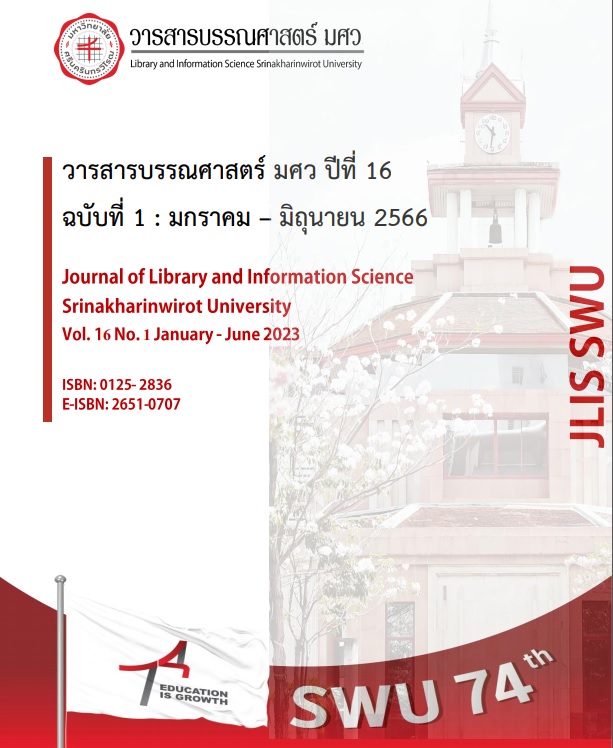ภูมิปัญญาท้องถิ่นในประเพณีภาคตะวันตกของประเทศไทย
คำสำคัญ:
ภูมิปัญญาท้องถิ่น, การถ่ายทอดภูมิปัญญา, ประเพณีภาคตะวันตก, การจัดการความรู้บทคัดย่อ
การวิจัยนี้มีวัตถุประสงค์เพื่อรวบรวมภูมิปัญญาท้องถิ่นและศึกษาวิธีการถ่ายทอดภูมิปัญญาท้องถิ่นที่ปรากฏในประเพณีภาคตะวันตกของประเทศไทย รวบรวมข้อมูลด้วยวิธีวิเคราะห์เอกสารและการสัมภาษณ์เชิงลึก กลุ่มผู้ให้ข้อมูลหลักประกอบด้วยผู้รู้และปราชญ์ชุมชน จำนวน 10 คน จาก 5 จังหวัด ได้แก่ ตาก กาญจนบุรี ราชบุรี เพชรบุรี และประจวบคีรีขันธ์ โดยเลือกแบบเจาะจง เครื่องมือที่ใช้ในการวิจัย คือ แบบบันทึกข้อมูลและแบบสัมภาษณ์เชิงลึกกึ่งโครงสร้าง วิเคราะห์ข้อมูลด้วยวิธีวิเคราะห์เนื้อหา ผลการวิจัยพบว่า ภูมิปัญญาท้องถิ่นที่ปรากฏในประเพณีภาคตะวันตกของประเทศไทยมี 4 มิติ ได้แก่ มิติด้านศาสนา ประกอบด้วย 1) การสืบทอดและทำนุบำรุงพระพุทธศาสนา 2) การปลูกฝังให้คนรุ่นหลังได้ศึกษาเรียนรู้พระธรรมผ่านกิจกรรมที่ทำในประเพณี และ 3) การปลูกฝังเรื่องการทำบุญทำทาน มิติด้านพฤติกรรมที่เหมาะสม ประกอบด้วย 1) การแสดงความกตัญญูกตเวทีต่อบรรพบุรุษ 2) การปลูกฝังเรื่องความกตัญญูต่อสิ่งที่มีคุณ และ 3) การปลูกฝังเรื่องความสำนึกในคุณค่า รู้ประหยัด รู้จักเก็บรักษา มิติด้านความสัมพันธ์ในสังคม ประกอบด้วย 1) การปลูกฝังค่านิยมและพฤติกรรมการรักนวลสงวนตัวให้แก่คนหนุ่มสาว 2) การปลูกฝังเรื่องความสมัครสมานสามัคคี 3) การปลูกฝังความนอบน้อมและให้ความเคารพต่อผู้อาวุโส และ 4) การปลูกฝังเรื่องความอ่อนน้อมถ่อมตน มิติด้านการสร้างสันทนาการและกำลังใจ ประกอบด้วย 1) การเสริมสร้างขวัญกำลังใจและความเป็นสิริมงคล และ 2) การพักผ่อนหย่อนใจและสร้างความสนุกสนานเพลิดเพลิน ส่วนวิธีการถ่ายทอดภูมิปัญญาท้องถิ่น มี 5 วิธี ได้แก่ 1) การปฏิบัติจริง 2) การบอกเล่า 3) การเรียนรู้ด้วยตนเอง 4) การแสดงและการละเล่น และ 5) การบันทึกองค์ความรู้
เอกสารอ้างอิง
Aritonang, I. Y., Sibarani, R., & Perangin-Angin, A. B. (2022). Local Wisdom of the Martumba Tradition of the Toba Batak Community in Sianjur Mula-Mula Village, Samosir Regency, North Sumatra: Anthropolinguistic Study. East Asian Journal of Multidisciplinary Research, 1(11), 2417-2424.
Chaichana, N. (2019). Kaeng Buan of Ban Taling Daeng and Local Food Security. Inthaninthaksin Journal, 14(1), 121-151. (In Thai)
Churintr, P. (2005). Personalities of Weaving trainer trainer on the Effectiveness of a Specific Type of Knowledge transfer : A Case Study of Thai Silk Weaving in Purmraeng Community, Suratthani. Suratthani: Faculty of Management Sciences Suratthani Rajabhat University. (In Thai)
Cultural Information Center, Ministry of Culture. (2020). Kran Tum Kwan Kaow. Retrieved from http://123.242.145.13/album/193014/การทำขวัญข้าว. (In Thai)
Dittawiron, N. (2015). Communication for Exchanging the Knowledge and Passing on Intangible Cultural Heritage. The Journal of Social Communication innovation, 3(2), 39-48. (In Thai)
Eawsriwong, N. (2014). National Education and Local Wisdom. Bangkok: Amarin Printing. (In Thai)
Goodkind, H. W. (1998). Transferring Leaming: Building Organizational Capacity form Within. USA: University of Oregon AAC.
JueTee, A. (2020). Fad Khao Chao Kariang Tradition. Retrieved from https://scholar.kru.ac.th/scholar/?news=ประเพณีฟาดข้าวชาวกระเห. (In Thai)
Kanchanaburi Province. (2018). Song Nam Phra “Songkran Mon” Tradition. Retrieved from https://ww2.kanchanaburi.go.th/travel1/detail/5. (In Thai)
KaeoSuk, O. (2000). Report on the results of the workshop on transferring knowledge of local wisdom and disseminating knowledge to the media. Ubon Ratchathani: non-formal education center Northeast. (In Thai)
Kitipat. (2020). Thambun Thanon Tradition. Retrieved from https://kitipat1101blog.wordpress.com/ประเพณี/ประเพณีทำบุญถนน/. (In Thai)
Kridakorn, S. (1998). Local Culture Transmission: A Case of Aumphoe Lang Suan Chumphon Province. Master thesis, Silpakporn University, Nakhon Pathom, Thailand. (In Thai)
Kunpluem, p. & Sowanpreecha, R. (2016). Knowledge Management for Local Wisdom. Sripatum Chonburi Journal, 12(6), 89-97. (In Thai)
Meesup, P., Phengphum, T., Jaichalad, N., & Soontorn, T. (2016). The Study of Local Wisdom of Phai-Chumphon Municipality, MuangPhitsanulok District, Phitsanulok Province. Journal of Faculty of Education Pibulsongkram Rajabhat University, 3(2), 62-75. (In Thai)
Ngio-Supha, A. (2017). Guidelines of Transfering Local Wisdom of the Silk Weaving Group in Nong Khae Village, Tongkhob Sub-District, Khoksisuphan District, Sakon Nakhon Province to the New. Generation. Graduate Studies Journal, 14(2), 95-102. (In Thai)
Nonaka, k., & Takeuchi, h. (1999). Classic work: Theory of organizational knowledge creation. USA: The MIT Press.
Petkaew, C. (2004). Elevation and implementing local wisdom in the present situation. Journal of Substance Thai Language, 3(3), 14-22. (in Thai)
Panalai, P. (2008). The Transmission of Folk Customs, Beliefs and Ritual Wisdom by “Mor Sen Ruen” Among the Thai Song Dam Cummunity of Muang District in Chumphon Province. Master’s thesis. Silpakorn University, Nakhon Pathom, Thailand. (In Thai)
Pesurny, A. J. (2018). Local Wisdom in a New Paradigm : Applying Systerm Theory to the Study of Local Culture in Indonesia. IOP Conference Series : Earth and Environmental Science, 175(012037), 1-8
PhotSiTa, C. (2007). The science and art of qualitative research. Bangkok: Amarin Printing. (In Thai)
Prommanot, P., Tubporn, H., & Sachakul, K. (2019). Pound nets fisher : The local wisdom and inheritance of Samutsongkram fisheries culture. Silpakorn University Journal, 39(2), 50-66. (In Thai)
Sinprasert, N. (2014). Wua Lan. Retrieved from https://sites.google.com/a/pbru.ac.th/canghwad-phechrburi/waw-lan. (In Thai)
Sirasoonthon, P. (2007). Community of practice (COP) : concepts, techniques and process. Bangkok: Chulalongkorn University Press. (In Thai)
Somaketrin, C. (2007). Management of Sisaket local knowledge for sustainable competition. Sisaket: Sisaket Rajabhat University.
Sungsri, S. (2007, June-November). Local Wisdom and Learning Society Creation. STOU Educational Journal, 2(3), 99-100. (In Thai)
Sutheewasinnon, P. & Pasunon, P. (2016). Sampling Strategies for Qualitative Research. Parichart Journal, Thaksin University, 29(2), 31-48. (In Thai)
Talaluck, P., Chinnasri, O., & Thongpunya, T. (2019). Social Capital and Inheritance of Local Wisdom Phetchaburi’s Art and Craft of Look Wa Group at Phetchaburi Province. Journal of Social Development, 21(2), 28-44. (In Thai)
TeawRatchaburi.COM. (2020). Yiap Lang Kariang tradition. Retrieved from https://www.xn--b3czk4afcy3gxah5a1g4e.com/กิจกรรมในราชบุรี/ประเพณีเหยียบหลังกะเหร. (In Thai)
Vachirayano, V. (2021, January-April). The Modelof Transferring LocalWisdom in BuddhistTradition of People in Surin Province. Journal of Palisueksabuddhaghosa Review, 7(1), 28-40. (In Thai)
Wahyu, W. (2021). Local Wisdom in Bajarese Culture Perspective. Advances in Social Science, Education and Humanities Research, 636, 648-653.
Wanwichai, R. (2017). Traditional Thai Folk Wisdom with Role of Local Community in Conservaing : Case Study in Lakhon Chatri in Phetchaburi Province. Institute of Culture and Arts Journal, Srinakharinwirot University, 18(2), 98-106. (In Thai)
Wongboonmak, S. (2015). The Knowledge Management on the Local Wisdom About Marble Handicraft Phrankratai, Prankratai District in Khamphaeng Phet Province. The Golden Teak : Humanity and Social Science Journal. 21(2), 83-98. (In Thai)
Wungrath, J. (2021, June). Knowledge Management for Local Wisdom of Rai Lue Food. Turkish Online Journal of Qualitative Inquiry, 12(5), 1205-1211.
ไฟล์ประกอบ
เผยแพร่แล้ว
ฉบับ
ประเภทบทความ
สัญญาอนุญาต
ลิขสิทธิ์ (c) 2023 คณะมนุษยศาสตร์ มหาวิทยาลัยศรีนครินทรวิโรฒ

อนุญาตภายใต้เงื่อนไข Creative Commons Attribution-NonCommercial-NoDerivatives 4.0 International License.
เกี่ยวกับลิขสิทธิ์
ลิขสิทธิ์ของบทความที่ปรากฏในวารสารบรรณศาสตร์ มศว เป็นของผู้นิพนธ์และคณะมนุษยศาสตร์ มหาวิทยาลัยศรีนครินทรวิโรฒ ทั้งนี้ บทความทุกเรื่องผ่านการตรวจสอบความถูกต้องทางวิชาการจากผู้ทรงคุณวุฒิ ข้อความและข้อมูลของบทความในวารสารฯ เป็นแนวคิดของผู้นิพนธ์ มิใช่เป็นความคิดเห็นของกองบรรณาธิการและมิใช่ความรับผิดชอบของคณะมนุษยศาสตร์ มหาวิทยาลัยศรีนครินทรวิโรฒ ไม่สงวนลิขสิทธิ์การนำไปใช้ประโยชน์ทางวิชาการ แต่ต้องอ้างอิงแสดงแหล่งที่มาและที่อยู่ในขอบเขตของกฎหมายลิขสิทธิ์



